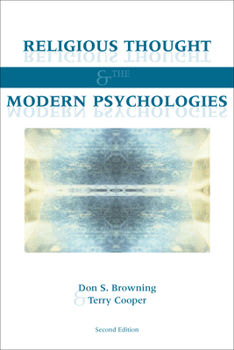Religious Thought and the Modern Psychologies
Select Format
Select Condition 
Book Overview
The first edition of this book pioneered a broader and deeper critique of psychological theories and practices. Informed by hermeneutical theory, Browning's widely acclaimed work drew attention to the ethical and even religious assumptions underlying psychology and has been deeply influential in psychology, pastoral counseling, and practical theology. In this edition, Browning and his new co-author show how the field of social science has...
Format:Paperback
Language:English
ISBN:0800636597
ISBN13:9780800636593
Release Date:June 2004
Publisher:Fortress Press
Length:304 Pages
Weight:1.18 lbs.
Dimensions:0.8" x 6.1" x 9.0"
Customer Reviews
3 ratings
For intermediate to advanced psychology students
Published by Thriftbooks.com User , 20 years ago
Now in an updated second edition, Religious Thought and the Modern Psychologies is a close study of how ethical and even religious assumptions have played a powerful underlying role in the formation of modern psychology - perhaps too powerful. Hermeneutical theory is applied in chapters discussing underpinnings of Freud, Skinner, Jung, aspects of Christian Anthropology, and much more. A scholarly text for intermediate to advanced psychology students, practitioners, theorists, and teachers, Religious Thought and the Modern Psychologies is an excellent resource and focus for discussion in the search to better understand the human mind, and the often fallible venues pursued to do so.
A Classic in Theology and Psychology
Published by Thriftbooks.com User , 20 years ago
The purpose of the book, as the author puts it, is to "uncover the ethical and metaphysical horizon of some of the major contemporary psychotherapeutic psychologies" (ix). To do this, the author analyzes implicit principles of obligation and what the author calls "deep metaphors" imbedded in and around conceptualities of psychology. Browning's work in this book has been vital reading for those engaging in issues related to psychology and religion. Presuppositions and resources in the Jewish and Christian religious traditions inform Browning's critique. Among the dominant psychologies that the author addresses are those of Freud, Jung, behavioral psychology, humanistic psychology, and Erickson. The dominant religious figures used to criticize and engage the psychologies include Reinhold Niebuhr, William James, and Paul Ricoeur. The author believes that modern psychologies are indispensable for modern life and that they should be evaluated for the ways in which they play the role of religion in modern thinking. Clinical psychologies cannot avoid a metaphysical and ethical horizon. A major assumption made by the author is that "traditional religion and modern psychology stand in a special relation to one another because both of them provide concepts and technologies for the ordering of the interior life" (2). The author labels various contemporary psychologies as "cultures." He associates Freud with, what he calls, "the culture of detachment"; the culture of detachment sees the world as basically hostile and humans are largely self-absorbed creatures with only small amounts of energy for larger altruistic ventures. Humanistic psychologies and Jung are variations of what he calls the "culture of joy"; the culture of joy sees the world as basically harmonious. Skinner is the example of the "culture of control"; the culture of control sees humans primarily as controlled and controllable by their environment. Erickson and Kohut are examples of the "culture of care;" the culture of care grasps the tensions and anxieties of life and gravitates toward an ethics that finds a place for both self-love and self-transcending love for the other. Browning finds most affinities between Christian thought and the culture of care in the though of Erickson. "It is my thesis that significant portions of modern psychologies, and especially the clinical psychologies, are actually instances of religio-ethical thinking" (8). "It is not only in theology," claims Browning, "but, to a surprising extent, in the modern psychologies as well, that the way we metaphorically represent the world in its most durable and ultimate respects, influences what we think and what we think we are obligated to do" (20). When addressing the Freudian-based modern psychologies, the author argues that psychoanalysis oscillates between ethical egoism and cautious reciprocity. By contrast, Christianity celebrates the principle of self-giving love and justice. The critical
A Fruitful Critical Conversation
Published by Thriftbooks.com User , 23 years ago
In his book _Religious Thought in the Modern Psychologies_, Don Browning attempts a critical conversation between several modern psychological theories (e.g. humanistic, Jungian, Freudian, behavioral) and ethics and Christian theology. He seems to have two goals. First, he wishes to show that while the psychologies as "sciences" claim empirical and ethical objectivity, underlying all of them are an implicit advocacy of a particular ethics as well as a particular unifying view of the cosmos (in the same way that a religion might view the world as ordered by the divine). Second, he compares and contrasts the way that these psychologies and Christianity approach such things as self-love and fulfillment and behavior towards others. In so doing, he provides critique of both psychology and Christian theologizing and allows the two to inform and enrich each other. Overall, Browning does an excellent job of constructing a fascinating dialogue between two different disciplines. Browing is a fairly dense writer. His use of new terms that he defines (e.g. "metaphors of ultimacy") is initially distracting. His focus on the particular thought of Reinhold Niebuhr and Paul Ricoeur, while informative, left me wishing that he had drawn as broadly from religious and philosophic sources as he did from psychological ones. Nonetheless, I thought the book was a very insightful. Browning is very convincing in his arguments and provides lots of ground for further discussions. SOme of the density of his writing stems from his desire to state his ideas precisely and I rarely felt him to be caught up in rhetoric or polemic. I read this book for a graduate class on psychology and religion, but would recommend it for anyone interested in a very rich (and occasionally demanding) dialogue between two quite distinct disciplines.






